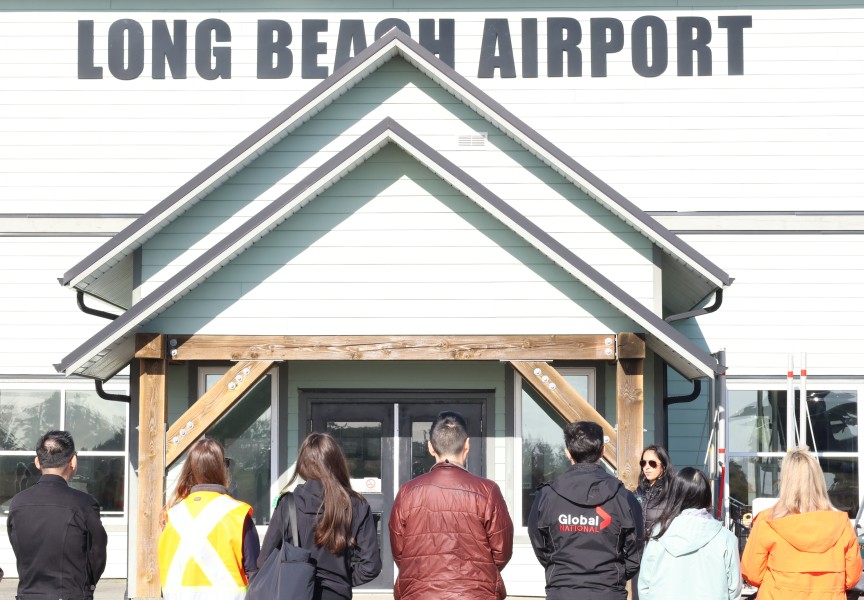Eighteen years after they were moved from their island home to Oclucje – because they had no running water, residents are forced to truck in water after their well dried up August 27th.
Youth worker/part-time maintenance man Kyle Harry, 21, said the village received their food fish in the days prior to the 27th; some families received 200 sockeye and they all had to be cleaned and preserved. The demand for water was higher than normal but absolutely necessary in order to save the fish before it spoiled under the hot summer sun.
“People were cleaning their fish in their yards and hoses were running constantly to clean the fish,” Harry explained. And with no rain for two months it didn’t take long for the water tank and well to dry up.
The tiny village of Oclucje, population approximately 70, has only eight occupied homes along with an administration and health building. Located more than 200km northwest of Campbell River, Oclucje is far, far away from the modern conveniences of city life.
Oclucje is serviced by a drilled well; water is pumped from the well up the hill to a large storage tank. The tank is so large, says Chief Walter Michael, that when the rain does start, it will take three days to fill it. But the Chief fears the well is no longer capable of supplying the water to meet the needs of the community.
Chief Michael is exploring water service options with DIA and Chatwin Engineering. DIA, he said is willing to truck water in and also fast-track approval for the drilling of a new well if necessary but solid plans have not yet been confirmed.
If the village is forced to wait for the rain and use the existing system, Chief Michael says the community will be permitted to use their water as the tank fills but on a very restricted basis.
In the meantime, residents drive 16km to Zeballos where they do laundry and shower at the homes of relatives. Chief Michael and Audrey Smith make at least ten trips a day to Zeballos, bringing in bottled drinking water and taxiing residents back and forth.
The Mars Water Bombers in Port Alberni are on alert in case of fire at Oclucje.
Kyle Harry meets the trucks and hauls 5 gallon bottles and pails to each and every home using a rider lawnmower. They also draw water from a nearby creek, filling buckets and totes so residents can flush their toilets. Michael says the day before they brought in 115 gallons of drinking water along with dozens of 5 gallon pails of creek water to take care of the people for one day.
Chief Michael’s home is perched on a hill overlooking the community and with a breath-taking view of Espinoza Inlet. The yard is cluttered with blue plastic drinking water bottles and pails and totes of creek water.
The Band Office is closed because of the lack of water but that doesn’t mean the staff has nothing to do. On day four of the water crisis, Chief Michael rests in his arm chair and sighs, “Just cooking and doing the dishes is an all day job!” Between running back and forth for water he’s had to boil water to do his dishes and bathe the grandchildren.
He contemplates how he will go about doing his laundry, because it needs to be done soon. He glances over to his grandson Jord and says he needs to get him school clothes and supplies. “Maybe the fair will be in town this weekend, maybe we can take our laundry with us and do it then,” he said as the boy’s face lights up.
When asked how long the situation would go on Michael replied he had no idea. His hope, he says, is that Chatwin Engineering will drill a new well before the rainy season starts. “We need to upgrade, it would be good to have two systems,” he explained, “the new one for daily use and the old one for backup.”
Michael says the water shortage hasn’t caused any health problems yet. They are supplying the elders and all people with water so they can flush toilets. Some are opting for disposable dishes and cutlery to cut down on the workload and water demand.
He said he was just finishing up canning the last of his 200 sockeye when the taps ran dry. His mother Rose lost a few salmon which she tossed onto the beach. The next day the carcasses were crawling with crab. “Oh, we had a good crab feast last night!” she smiled.
By Denise August







